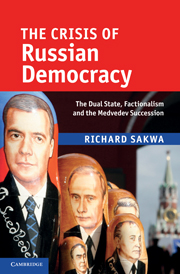Book contents
- Frontmatter
- Contents
- List of tables
- Preface
- Acknowledgements
- Note on transliteration
- 1 The dual state in Russia
- 2 Succession struggles and electoral contests
- 3 Political power and factionalism
- 4 A genuinely political economy
- 5 Managed succession
- 6 War of the Putin succession
- 7 Duma selection
- 8 Presidential succession
- 9 Medvedev's challenge
- 10 Conclusion: transcending the dual state
- Bibliography
- Index
5 - Managed succession
Published online by Cambridge University Press: 05 June 2012
- Frontmatter
- Contents
- List of tables
- Preface
- Acknowledgements
- Note on transliteration
- 1 The dual state in Russia
- 2 Succession struggles and electoral contests
- 3 Political power and factionalism
- 4 A genuinely political economy
- 5 Managed succession
- 6 War of the Putin succession
- 7 Duma selection
- 8 Presidential succession
- 9 Medvedev's challenge
- 10 Conclusion: transcending the dual state
- Bibliography
- Index
Summary
The 2007–8 elections were predictable in broad terms but accompanied by surprising shifts in tactics and unexpected coups de main as the cycle unfolded. As one commentator noted, ‘This predictability is one of the main achievements of the Kremlin, which has spent the last two–three years consistently building its defences against any type of “orange threat”. And, it has to be admitted, it has been most successful in this.’ It was for this reason that opposition groupings questioned the legitimacy of the elections, echoed by many in the west. However, the placid appearance of the election cycle belied the turmoil beneath the surface. The formal election process was accompanied by a second, subterranean, struggle in which Putin sought to mould the succession, while the factions sought to shape Putin's preferences and to force an outcome to their advantage. Putin's overall goal was to ensure an orderly transition not only from one leader to another but also, in his conception, from a period of stabilisation to one of modernisation. As far as the Putin elite were concerned, all this was threatened by external dangers. The ‘orange revolution’ in Ukraine in autumn 2004 had enormous impact on that elite, and the fear of a new Russian revolution was palpable. Opinion polls in July 2005 found that 42 per cent (up from 32 per cent a year earlier) believed that a colour revolution on the Georgian, Ukraine or Kyrgyz model was possible in Russia.
- Type
- Chapter
- Information
- The Crisis of Russian DemocracyThe Dual State, Factionalism and the Medvedev Succession, pp. 160 - 183Publisher: Cambridge University PressPrint publication year: 2010



